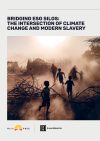Climate
change and Modern
Slavery
New tools to help investors disclose and manage climate-related modern slavery risks.
The Bridging ESG Silos: The Intersection of Climate Change and Modern Slavery report from Walk Free and AllianceBernstein is designed to help investors understand and act on the links between material risks related to climate change, the transition to renewable energy and modern slavery.
Investors are increasingly exposed to both the physical risks of climate change, from weather extremes and intensifying natural disasters, and transition risks as economies and societies move towards decarbonisation. There are clear links between climate change, the energy transition and increased vulnerability to human rights abuses such as human trafficking and modern slavery.
Today, responsible investors integrate material environmental, social and governance (ESG) factors into their investment decisions. But ESG integration often remains siloed and neglects important connections between issues. These connections are significant between environmental and social factors, such as climate change and modern slavery.
The report uses seven case studies to demonstrate how investors can be exposed to modern slavery risks from climate change and the energy transition. It also provides takeaways for investors to help them address actual or potential impacts and offers new tools to manage and disclose climate-related modern slavery risks: a climate-reporting supplement and investor stewardship guidance.
Case Studies
Physical risks case study

Super Typhoon Haiyan displaced 4.4 million people when it struck the Philippines in 2013. The immense destruction of homes and livelihoods resulted in large-scale migration to Manila. Human trafficking then surged as human traffickers preyed on displaced men, women and children.
Investor takeaways:
- Identify and monitor whether operations and/or supply chains are in an area susceptible to sudden-onset climate-related events.
- Identify if labour considerations are accounted for in these high-risk geographies, such as the risk of large-scale migration following sudden-onset climate-related events.
- Identify and monitor whether any labour-intensive parts of operations and/or supply chains are in an area susceptible to generating or receiving a large number of climate migrants.
- Understand if due diligence is being conducted in these high-risk geographies and within labour-intensive parts to identify modern slavery risks and work to mitigate them, remedy adverse impacts, track and measure progress, and report any findings.
Transition risk case study

Cobalt is a key mineral component in lithium-ion batteries used in electric vehicles, electronic devices, jet engines and renewable energy storage. A significant portion of the world’s land-based cobalt reserves are found in the Democratic Republic of Congo (DRC), where cobalt mining is tied to serious human rights allegations — it is estimated that at least 35,000 children work in the industry.
Investor takeaways:
- Identify whether a responsible sourcing policy for cobalt is aligned with relevant aspects of the OECD’s Due Diligence Guidance for Responsible Supply Chains of Minerals from Conflict Affected and High-Risk Areas, and how this policy is implemented.
- Understand what proportion of DRC-origin cobalt in a supply chain has a connection to artisanal and small-scale mining.
- Identify whether a supplier code of conduct reflects relevant international standards, such as the ILO’s Declaration on Fundamental Principles and Rights at Work, which covers child labour, and how compliance of suppliers is assessed.
New Tools
Climate reporting supplement
This tool provides recommendations on how investors can take a systematic approach to identifying physical and transition risks.
Investor Stewardship guidance
This tool provides general guidance to investors looking to incorporate material climate-related modern slavery risks into their corporate engagements.







